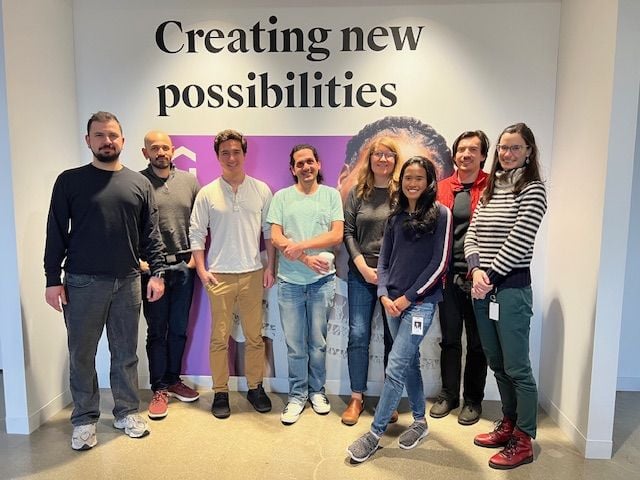When ChatGPT was launched publicly on November 30, 2022, the need to hone an understanding of generative AI arose overnight, leaving technologists across the globe asking themselves, “Where can I study this stuff?”
Unbeknownst to them, Udemy was way ahead of the GenAI game. Just 11 days after ChatGPT’s release, the Udemy Marketplace had its first course published on the new technology, becoming the first online learning platform to do so.
This is simply one example of how Udemy remains on the cusp of advancements across the tech industry, giving its customers the knowledge they need to thrive in an ever-changing landscape.
One major landscape shift is in the organizational structure itself. According to a 2022 survey by Deloitte, organizations are increasingly experimenting with a structure that focuses on skills, not job titles. As more employers transition to becoming skills-based organizations, Udemy is ready to take its upskilling solutions to the next level.
THE SIGNIFICANCE OF A SKILLS-BASED ORGANIZATION
According to the Udemy team, a skills-based organization “leverages skills through its talent processes, resulting in a more agile and flexible workforce.” In other words, by focusing on skills development, an organization benefits both its employees and its operations as a whole. “We have reviewed research showing that when organizations place priority on the skills employees have rather than the roles they occupy, it actually drives better business outcomes, higher employee retention and more talent mobility,” explained Director of Product Management Kristin Pyun.
Earlier this year, Udemy unveiled their roadmap for several new GenAI-enabled offerings through its Intelligent Skills platform, which includes an AI Skills Mapping and Guidance tool. According to Director of Product Management Kristin Pyun, this new solution is designed to support organizations’ employee training and development efforts by facilitating faster adoption of in-demand skills.
“We’re building a tool that will enable leaders and managers to better define the skills they want to develop within their organization or teams and then identify the right Udemy content that maps to that skill definition,” she explained.
Software Engineer Architect Mathilde Caron, who has helped bring Udemy’s Skills Mapping and Guidance solution to life, considers the work that has gone into building it to be “multifaceted.” She said she and her teammates have leveraged various cutting-edge technologies and continuous teamwork to ensure the new tool can support all of its planned capabilities.
Yet for Director of Data Science and Engineering Micah Richard, the success of this project doesn’t hinge entirely on technical acumen and collaboration. He believes it comes down to one of Udemy’s company values, “courageously experimental,” which empowers his team to continuously iterate and ultimately deliver intentional and ever-evolving solutions.
“We’re thinking carefully about what we release, how we release it and how we evaluate those releases,” Richard said. “Even though we know that the earliest versions may not be exactly what we want, we want to ensure that they’re as valuable as possible, and we’re using that to iterate as rapidly as possible.”
With the creation of the Skills Mapping and Guidance tool and other new offerings, Udemy is embarking on a GenAI journey to help organizations and their employees succeed while leading the transition to a skills-based economy. And to stay on this path toward transformation, the company’s tech teams rely on a robust tech stack — and each other’s determination and expertise.
UDEMY INTELLIGENT SKILLS PLATFORM
Designed to support personalized learning and enhanced skills development, the comprehensive, GenAI-powered Udemy Intelligent Skills Platform “ensures learners and organizations can easily identify and develop the skills they need today and in the future,” said President and CEO Greg Brown. The platform’s tools, which are scheduled to launch throughout 2024, include:
Udemy AI Learning Assistant: This intelligent, chat-based assistant will help learners discover the right content for them, summarize course content for easier consumption and offer personalized feedback to accelerate learning.
Udemy AI Skills Mapping and Guidance: This tool will help organizations translate their roles’ loosely defined, high-level needs into detailed lists of skills required. With this tool, organizations will be able to develop personalized and scalable custom learning paths (referred to as “guidance”) that map skills to learning content.
Gen AI-powered Q&A: This offering will recognize a learner’s question and suggest an answer to the instructor, who is given the opportunity to review and vet the answer before posting it in the discussion forum. Learners will benefit from accurate, clear responses delivered quickly, and instructors will benefit from saving valuable time.

Collaboration Meets Cutting-Edge Tech
It’s one thing to dream up a solution as impactful as Udemy’s Skills Mapping and Guidance tool. But what does it actually take to bring an idea of this caliber to life?
Before Udemy’s tech teams “broke ground” on their new product, Richard explained, they had to first determine what was actually possible to achieve.
“Obviously, the broader vision is important, but there’s also a need to bring that down to the level of what we’re actually able to accomplish initially and what we want it to look like long term,” he said.
And without tight-knit collaboration, these preliminary questions would have never been answered. Richard noted that cohesion between the company’s machine learning, engineering, data science, product and product engineering teams has played a key role in developing the solution as quickly as possible.
“Cohesion between Udemy’s machine learning, engineering, data science, product and product engineering teams played a key role in developing the solution quickly.”
“This is a high-priority need from a lot of customers, which means that we’re not able to spend a year in development like you’d think,” he explained.
With a tight timeline in place, those involved in the development phase have relied on the power of a cutting-edge tech stack. Caron said that the company’s machine learning team has implemented systems that support various phases of AI generation, such as integrating approaches their data science teams iterate and evaluate on and deploying AI generation tasks for real-time and offline batch processing.
To support those systems, Caron added, the tech teams use their own microservices architecture, predominantly with Kotlin and Python services, along with their Kafka ecosystem for GenAI task processing and storage solutions, such as DynamoDB and Elasticsearch. Ultimately, the company’s product engineering team and front-end engineers ensure that they can easily integrate all of the work that has been done by data scientists and back-end engineers to reflect it to their front-end layers, enabling learners to effectively interact with the solution.
According to Caron, all of these efforts — carried out by individuals based across the United States, Ireland and Türkiye — reflect the cultural engine that drives Udemy’s technological endeavors: a culture that empowers them to work seamlessly together across continents to build products that continuously transforms people’s lives.
“When pioneering new concepts or tools to solve new challenges like this one, allowing space for experimentation and iteration across all layers and teams — from data science to back-end services — is crucial for refining products over time and delivering useful features to our learners, instructors and organizations,” Caron said.

Anchored in Empowerment
Empowerment is the cornerstone of Udemy’s culture, guiding how solutions are nurtured, from being novel ideas to critical components of the company’s product roadmap.
Pyun noted that this enables every team member, even if they work outside of product, engineering and data science, to play a direct role in shaping the company’s product suite.
“One of the things that I’ve really loved about working at Udemy is our bottom-up approach to innovation,” Pyun said. “There’s a lot of encouragement for people to share their thoughts and ideas.”
Whether they’re busy writing code or doing heads-down work in product design, technologists at Udemy are always exploring ways to get in the weeds — and evolve in the process. And given how closely the company embraces the latest technologies and trends, Caron noted, it’s easy for team members to find ample room to grow.
“Being at the forefront of technology means we’re constantly exposed to new ideas, tools and methodologies, which is crucial when one works in this industry,” she said.
“Being at the forefront of technology means we’re constantly exposed to new ideas, tools and methodologies, which is crucial when one works in this industry.”
As the company continues to build out its product suite, its tech teams are eager to take on more GenAI projects. Pyun shared that she’s looking forward to crafting solutions that will offer learners more personalized support and help instructors scale their content.
Richard believes that these projects offer technologists the opportunity to drive GenAI innovation with positive influence, posing the potential to radically redefine how new skills are adopted and utilized across the industry, a true milestone in the shift toward a skills-based economy.
“As we build and scale these types of experiences, we expect the velocity and impact of learner skill acquisition to increase dramatically, which will help learners meet their personal and professional goals much quicker,” Richard said.








